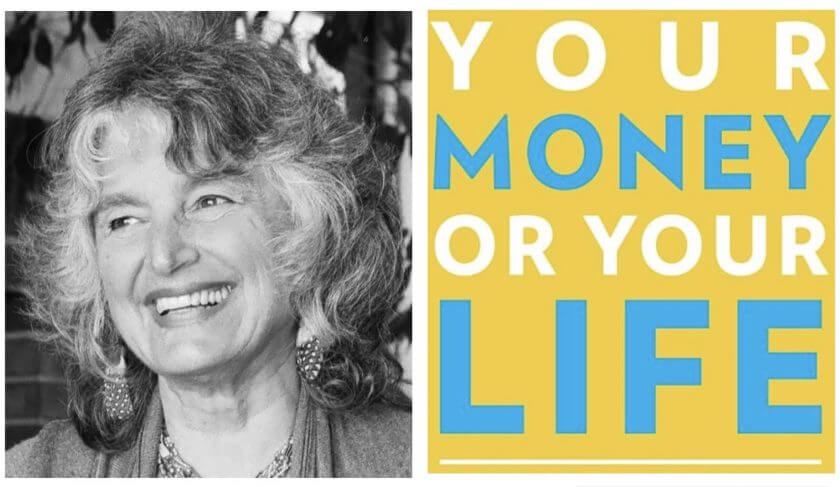
This article is part of a new HerMoney Healthline series where we ask pros in a wide range of fields for their top tips on making it through the social and economic crisis caused by the coronavirus pandemic. Browse past HerMoney Healthlines here.
With the world turned upside down by the pandemic, we have the opportunity to examine our lives — and what we do with our money — with new perspective. These days it seems someone is talking about this clear message from the greater beings, forcing us all to hit “reset” on our lives. Maybe you were overextending yourself at the office, or you’ve been so distracted by social media, you’ve forgotten to look around at what the world is really about. Whatever your life was, it is now taking a massive pause, which gives an unprecedented opportunity to just relax.
And that goes for our money, too. This pandemic might be just what you needed to kick the savings-driven part of your brain into overdrive, and give that other shopping-hungry piece a rest. It is time to reassess where you stand financially and either make peace with it, or put the tools in place to get you where you need to be.
Who better to guide us than Vicki Robin, co-author of the seminal book “Your Money Or Your Life,” which challenged a generation to do just that. The book, co-authored with her late partner, Joe Dominguez, asked readers to think critically about what they were really working toward financially, and how they could live authentically in a consumer-driven world. Last October on the HerMoney podcast Vicki spoke with us about the concept of having “enough.” In this time of loss we turn back to her for advice on how to appreciate what we still have … and what to do if we’re struggling. Here’s what she had to say:
If you have more than enough
Some are fortunate to still live in the dual-income household they know, without any furloughs, lay offs, or salary reductions. If this sounds like you, try to cherish that paycheck and stability instead of complaining about the struggles of working from home. It might be time to kick up your saving, too, because in such uncertain times, no one is sure of what will come next. While things are stable for you, consider those who are struggling. “If you are still well employed or with secure passive income, now is the time to be generous beyond your prior range. Food banks are challenged. Shelters are challenged. Social services are challenged. Non-profits that protect the environment are challenged. Giving bigger in these times affirms your good fortune,” Robin says.
If you have just enough
“Now is the time to economize — to look at everything from your storage shed or garage to your cupboards to your subscriptions. Where can you conserve without biting into your well-being? It’s also time to look at your diet. What can you do to have less expensive meals that taste just as good, if not better?” Robin says.
“Shave a bit off your expenses to create a margin for yourself, that penny jar or reserve fund that will allow you to weather this no matter how long it lasts. Building up a reserve fund, if only by a few dollars a day, will give you a greater sense of security in insecure times,” she adds.
If you don’t have enough
“Forgive yourself for being stuck somewhere that’s mostly the result of a weak social safety net and bloated wealth at the top. Maybe you could have done something different in the past, but so what? Now is now, and self-blame and self-pity will drag you down,” suggests Robin.
She adds: “In a society that values rugged individualism, now is the time to ask for help. You can do that by using the food bank, by using all government programs designed to keep small businesses and gig workers afloat, by using your congressperson’s office or church or the internet to guide you to resources. If social media is a natural environment for you, there are so many Facebook groups for every hobby or problem or special interest under the sun. Use your search engine to find one with people like you and ask them how they are getting by.”
The upside of all of this
We’re all doing this together. All over the world there are people feeling almost exactly the same way you do, so take advantage of that. This social-distancing has created a world that is closer than ever, and one where we want to help each other more than we did before. “Social solidarity is high right now. The social glue that got weaker in the good times is getting stronger now as people realize we need one another and need to help one another. Let this warm your heart as you take steps commensurate with your means.”
To hear Robin’s original HerMoney podcast about having enough, listen in here.
More HerMoney Healthline advice:
- Frank Abagnale, author of The New York Times’ Best-Selling book “Scam Me If You Can,” on how to spot coronavirus scams and avoid getting taken
- Melanie Katzman, author of the best-selling book, “Connect First: 52 Simple Ways To Ignite Success, Meaning, and Joy At Work,”on how to stay connected during this new reality
- Charles Duhigg, author of “The Power of Habit” and “Smarter Faster Better,” on how we can all rock the whole “working from home” thing
To get email updates every week when we publish a new show, join our HerMoney community here







